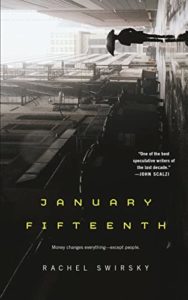Rachel Swirsky concludes the author’s note to her new speculative fiction novella, January Fifteenth, with these observations.
- Money can make life easier, but it can’t solve everything.
- Adding money to a system with underlying problems won’t fix those problems on its own.
- After any massive change, some people will be better off, some people will be worse off, and many people will be both better and worse off.
- However the future unfolds, it won’t go according to my values. There will always be outcomes I don’t expect. Some of them will contradict my beliefs about the world.
- I’m definitely wrong about something. (9)
It’s a refreshingly modest, mildly skeptical opening, and it’s one that let me know I was in good hands before the book even really began.

This modesty and skepticism is particularly important for EconLog readers, as Swirsky’s novella is a look at an imagined future America where the Universal Basic Income (UBI) has been voted into law. I came to the book braced for a didactic work, focused on “teaching” the reader to accept one or another point of view about the UBI, but Swirsky’s novella maintains this sense of modest questioning and exploration throughout. And it is all the better for it.
Four interwoven stories told from the points of view of four different female protagonists, Hannah, Janelle, Olivia, and Sarah, comprise the book. Their stories begin early in the morning of January fifteenth, now known as “Windfall Day,” when people receive their UBI payments from the government. Swirsky confesses in her author’s note that she has elected to pretend that this “practical side of running UBI” is fairly frictionless. She’s aware that this is unlikely, though, and various small moments of long lines at banks as people wait for their checks, complicated and delayed EFT transactions, and conversations among those who are worried that this is yet another way for government to get data about people point to her awareness of some of those issues while never overtaking the stories she is more interested in telling.
And those stories are interesting and complicated. Hannah, for example, is an abused woman, on the run and hiding from her ex with their two children. For her, the UBI provided enough money to make their escape from domestic violence possible. But it also provides her former spouse an annual income boost that funds a drug and alcohol fueled search for vengeance. January 15th and the UBI are, for Hannah, both the means of her liberation and an annual reminder of how trapped she is.
Janelle is a Black journalist whose story allows Swirsky some latitude to explore the racial complexities involved in an idea about UBI. As Janelle goes about her day, interviewing people about their plans for Windfall Day and their opinions about the UBI, she and her younger sister argue about the justice of UBI. Has it done enough–has it done anything–to address the economic crisis created by generations of restricted opportunities for people of color in America? Is it just a way of shutting down discussion of those inequities? For Janelle, the UBI has allowed her to care for her younger sister since their parents’ death. For her sister, Neveah, a fiery teenage activist, that personal angle is hard to remember amid all the inequality she sees and wants to solve.
Olivia is a young college student who returns to her home town for a Windfall Day party, which she and her wealthy friends refer to as “Waste Day.” Their goal, spurred on by the urgings of a podcast duo known as C&C, is to waste their UBI payments in as flagrant and disrespectful a manner as possible. It would have been easy for these sections of the book to become nothing more than rote critiques of the very wealthy, and there is some of that, but Skwirsky is really interested in a deeper conversation here about questions of wealth and responsibility. Her partying college students veer from drunken sexual assaults, to discussions of Ai Wei Wei’s smashing of a Han dynasty urn, to a Peter Singer inspired debate about how much of one’s wealth one should give to the poor, and when one is entitled to criticize others for how much they do or do not give.
For me, the least effective sections of the novella were those dedicated to Sarah’s story. A pregnant teenage bride in a polygamist splinter group in Utah, Sarah walks with her sister wives to claim her UBI payments. Along the way, we learn that the group has been beating up and throwing out young men, since there are not enough women to go around, and that they are still claiming the UBI payments for those young men. Less rich and complicated than the other stories, Sarah’s story has a clear right and wrong structure to it. The splinter group is obviously wrong and vicious. Sarah obviously must leave it. The UBI is obviously the thing that will allow her to do so. It’s not a bad tale, but its clear-cut morality felt, to me, a little simplistic after the complexities of the other sections.
January Fifteenth is a good read. It’s a particularly good read for those interested in the UBI or for those interested in literature that represents complicated economic issues in subtle ways. I’ll be interested to know what other EconLog readers think of it, what readings they might pair with it, and whether the book, and this review, might have appeared in time to inspire any changes to syllabi for the upcoming academic year.


READER COMMENTS
robc
Jun 22 2022 at 2:25pm
Its an interesting idea, but I have to imagine that any actual UBI would be monthly instead of yearly.
However, I kind of like the Thomas Paine idea of a single lump sum payment on a citizen’s 18th birthday. Industries would form to rapidly extract those payments from gullible youth.
Comments are closed.